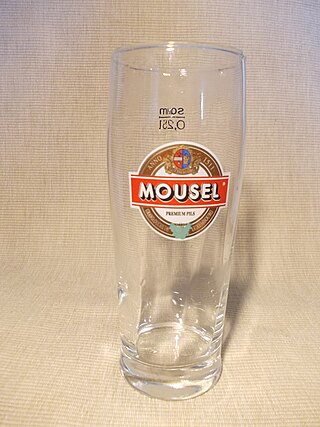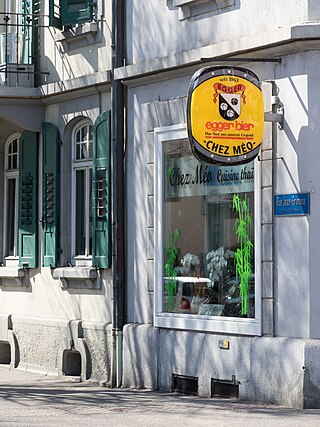 Logo of Clausel | |
| Location | Luxembourg City |
|---|---|
| Opened | 2007 |
| Owned by | Letzebuerger Stadbrauerei |
| Website | clausel.lu |
Clausel is a Luxembourgish beer brand founded by microbrewery Letzebuerger Stad Brauerei in 2007. [1]
 Logo of Clausel | |
| Location | Luxembourg City |
|---|---|
| Opened | 2007 |
| Owned by | Letzebuerger Stadbrauerei |
| Website | clausel.lu |
Clausel is a Luxembourgish beer brand founded by microbrewery Letzebuerger Stad Brauerei in 2007. [1]
The microbrewery Letzebuerger Stad Brauerei (in standard Luxembourgish: Lëtzebuerger Stadbrauerei) was founded in 2007 in Luxembourg City. They brew their beer brand Clausel in the old Mousel brewery in the quarter of Clausen. The name Clausel is a contraction of Clausen and Mousel. As of 2016 Clausel is the only beer brewed in Luxembourg's capital city.
| | This section is empty. You can help by adding to it. (March 2023) |
The following beers are sold under the Clausel name:

Brasserie Nationale is the largest brewery in Luxembourg, based in Bascharage. They also export to Belgium, France, China, and since 2014 to the United States. They brew beer under the brand name Bofferding and since taking over in 2004 Battin.

Kronenbourg Brewery is a brewery founded in 1664 by Geronimus Hatt in the Free Imperial City of Straßburg, Holy Roman Empire. The name comes from the area where the brewery relocated in 1850. The company is owned by the Danish multinational Carlsberg. The premium brand is Kronenbourg 1664, a 4.6% abv pale lager.

The culture of Luxembourg refers to the cultural life and traditions of Luxembourg. Most citizens are trilingual, speaking French and German in addition to the Germanic national language of Luxembourgish. Although its contributions to the arts are not largely known outside its borders, Luxembourg has a rich cultural history, especially in music, painting and photography. Its evolving museums, concert halls, theatres and galleries testify to its citizens' growing appreciation of culture.

Mousel is a beer founded in 1511 in Luxembourg.

Karlsberg is one of the largest breweries in Germany; the Karlsberg Group also owns various other beer brands. It is called Karlsbräu outside of Germany to differentiate it from the Danish brewing company Carlsberg.
Luxembourg's cuisine reflects the country's position between the Latin and Germanic countries, influenced by the cuisines of neighbouring France, Belgium and Germany. Recently, it has been influenced by the country's many Italian and Portuguese immigrants. As in Germany, most traditional, everyday Luxembourg dishes are of peasant origin, in contrast to the more sophisticated French fare.
Quebec beer is the beer brewed in Quebec, Canada, often with ingredients from Quebec itself and generally following the recipes of the French, Belgian and British brewing traditions. Generally, the beers brewed in Quebec differ from those in the rest of North America because of the relative importance of the French and Belgian traditions alongside that of Great Britain. German-type beers are also produced by some breweries.

The beers of the Caribbean are unique to each island in the region, although many are variants of the same style. Each island generally brews its own unique pale lager, the occasional stout, and often a non-alcoholic malta beverage. Contract-brewing of international beers is also common, with Heineken Pilsener and Guinness Foreign Extra Stout being the most popular. The beers vary between the islands to suit the taste and the brewing method used.
Les Brasseurs RJ is a brewery located in Montreal, Quebec, Canada. The company was founded in 1998 by Roger Jaar from the merger of three microbreweries: Les Brasseurs GMT, La Brasserie Le Cheval Blanc and Les Brasseurs de l'Anse. Current annual production capacity is over 125,000 hL; they claim to be the largest microbrewery in Quebec. They currently employ 450 people, including employees at the head office in Montreal, a distribution centre in Quebec City, and a brewery in l'Anse St-Jean that fills beer kegs.
Jean-Pierre Emile Boeres (1890–1944) was a Luxembourg composer, organist and choir master.

Most beer sold in France is pilsner lager, mass-produced by major breweries which control over 90% of the market, although there are also traditional beer styles, such as top-fermented Bière de Garde, and a number of microbreweries.
When Luxembourg was invaded and annexed by Nazi Germany in 1940, a national consciousness started to emerge. From 1941 onwards, the first resistance groups formed in secret, operating underground and in defiance of the German occupation. Their covert activities included aiding political refugees and those evading conscription into the German forces, as well as disseminating patriotic leaflets to bolster the Luxembourgish population's spirits.

Luxembourg has a long tradition of beer brewing, dating back to at least 1300. Although there used to be more than 12 local breweries in Luxembourg in the early 1950s, this number has come down to only three big breweries remaining in the early 2010s. The three big breweries still active today are: Brasserie Nationale, producing Bofferding and Battin, Brasserie de Luxembourg, producing Diekirch and Mousel, and Brasserie Simon, producing Simon and Ourdaller.

Brasserie Battin, is a Luxembourgish brewery founded by Charles Battin in 1937 in the city of Esch-Alzette. Since 2004 Brasserie Nationale owns Brasserie Battin; since 2005 the beer brand Battin is brewed in Bascharage.

Brasserie Béierhaascht, is a Luxembourgish microbrewery/brewpub founded in Bascharage in 2002.

Brasserie de Dudelange was a Luxembourgish brewery which was founded by Jean-Pierre Steyer in 1937 and brewed in the city of Dudelange. In 1964 it was taken over by Brasserie Funck-Bricher. Brewing in Dudelange as well as producing beer under the Brasserie de Dudelange brand name stopped.
Brasserie de Luxembourg is the second largest brewery in Luxembourg, based in Diekirch. They also export to Belgium. They brew beer under the brand name Diekirch and Mousel.

Grand Brewing Luxembourg, is a Luxembourgish brewery founded by Mark Hatherly in 2014.

Switzerland has a long tradition of brewing, with significant domestic beer production and a growing craft brewing sector.
Luc Schiltz is a Luxembourgish actor best known to international audiences for his role in the Netflix series Capitani.